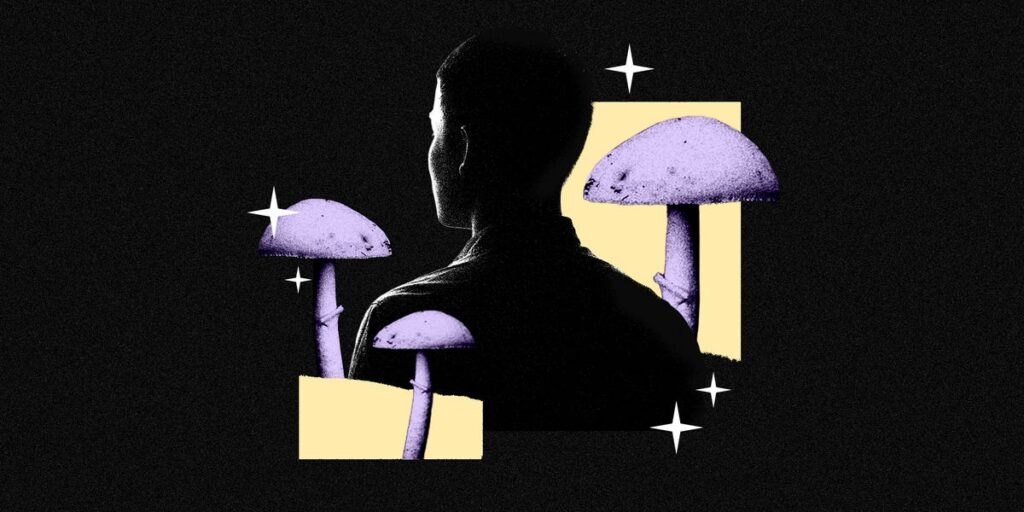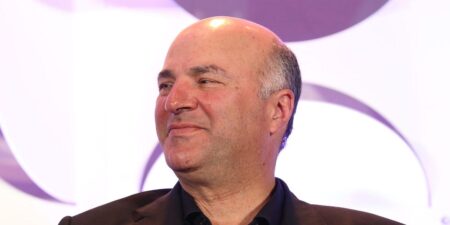- A tech worker uses microdosing to manage PTSD and improve her job performance.
- Microdosing helps her focus and reduces panic attacks, enhancing work efficiency.
- Despite the benefits, she remains cautious due to the potential risks of high-level mushroom use.
This as-told-to essay is based on a conversation with a 46-year-old tech worker from Atlanta who wanted to remain anonymous for privacy and professional reasons. Business Insider verified her identity and employment, and her words have been edited for length and clarity.
I work in tech for a notable Fortune 40 company. I began working for this company in 2004 when I was 26 years old. In 2012, my company placed me in Atlanta to open a new hub, so I moved there with my husband and daughter.
One day at work, I was told to speak to an employee who was deemed combative. On the way to speak to this person, I felt like I couldn’t catch my breath. I went to the bathroom to try to calm down, but I still felt out of breath. I continued through my workday with this feeling.
Later that day, I gave a presentation. As I began presenting, my voice and entire body began shaking. I didn’t realize it was a panic attack.
A couple of years later, in 2014, I began microdosing to battle those intense feelings. I realized it made me better at my job — even though I do have to be careful.
I started microdosing to help with my complex PTSD
I had a traumatic life as a child, which included abuse and abandonment. This caused me to develop complex PTSD, and I was diagnosed with dissociative personality disorder as an adult.
When I moved to Atlanta, it was the most stressful job I ever had. I was in charge of hundreds of employees who directly reported to me.
During this time, my ex-husband from my previous marriage began a court case to gain custody of our daughter. It was the most stressful time of my life. My colleague suggested I talk to a professional and get help, but I was afraid of seeing a cognitive behavioral therapist or “talk therapist.” Before I moved to Atlanta, talking about my past with a therapist made my body feel like it was physically in danger because of my CPTSD.
I also tried focus patches, ADHD medication, and all sorts of physical changes to my environment, but nothing worked, or the side effects were unpleasant. I didn’t want to put myself through that this time.
In April 2013, I began to attend a nondenominational church where I met a life coach. She recommended using mushrooms medicinally to process trauma. In December 2013, I attended my first medicine ceremony.
My performance at work was suffering
Although it helped me feel relieved, at this time, I was being told that my work performance was suffering. I was disassociating at work due to stress, which made my work performance inconsistent. I was disassociating outside work as well.
During my dissociations, I felt disconnected from my body and my environment. Sometimes I would be driving in my car and feel like my car was floating. I decided to give cognitive behavioral therapy another try.
From attending my medicine ceremonies, I learned about microdosing. My body is very sensitive to drugs and alcohol, so I was interested in finding out more about how microdosing would affect me. But I didn’t know where to get drugs. I found someone who sold me 10 microdosing capsules through my ceremony contacts for $40. I took the capsules for two days, then took one day off. Since I was taking them multiple days a week, this became expensive.
Buying from dealers was difficult and inconsistent, so I decided to grow my own mushrooms. I experimented and learned how to do it myself, growing it in a tub.
The combination of traditional talk therapy and microdosing has changed my life
Microdosing creates space between my mental, emotional, and physical states, so I disassociate less and am less prone to panic attacks. When I have big projects, I have difficulty figuring out where to start or what to focus on. Microdosing helps me focus on one task at a time to tackle the project in smaller parts and not feel overwhelmed.
Although my job requires coding, research is also a major component of my work. I often have to solve unique problems that don’t have a lot of literature about them. This makes it difficult to stay focused because I’m constantly going back and forth between coding and research, but microdosing helps me get into a state of flow.
Despite being a bit foggy about the problems I’m working on, I can stay on track when I switch between research and coding. It also helps me to remember new information better.
My therapist has cautioned me against medecine ceremonies
I do have to be careful. There was one time I accidentally took double the usual dose, saw my hands shaking, and realized that I was too intoxicated to work. I knew I couldn’t handle a meeting with coworkers in this state. Luckily, I was able to take some time during my lunch break to get back to my regular state and was able to get back to work.
I’m open with my therapist about my microdosing. She’s supportive, though she has cautioned me about attending medicine ceremonies because taking high doses of mushrooms can cause disassociation. My body already disassociates due to PTSD, so it could make things worse for me.
My performance has improved now I’m an advocate
I don’t need Xanax or antidepressants. I just need a little help. Microdosing helps me bridge the gap between traditional medication and white-knuckling it through life. My performance at work has improved a lot.
Since I began microdosing, I’ve been a much better mother, wife, employee, and person. I’m an advocate.
Editor’s note: There’s no medical consensus about whether these psychedelics have benefits, and these drugs can come with risks.
If you have any unique experience with microdosing at work and want to share your story, please email Manseen Logan at [email protected].
Read the full article here















